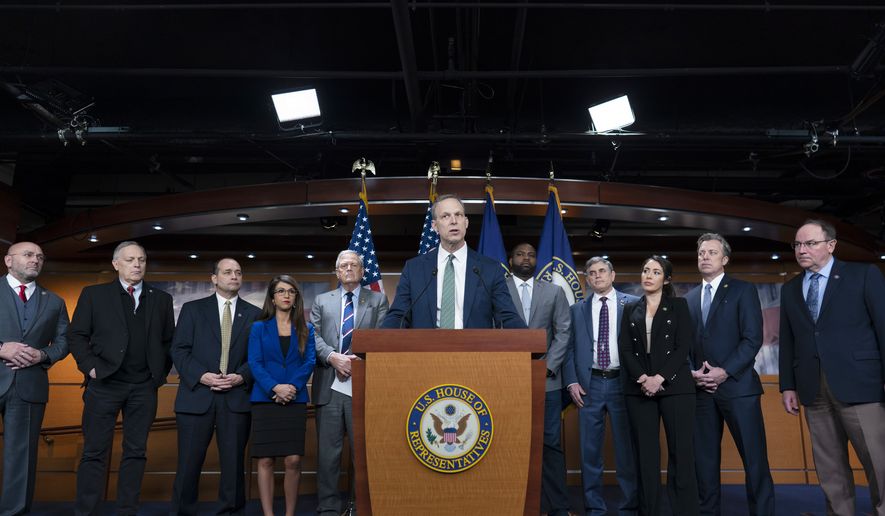A coalition of Freedom Caucus lawmakers laid out a series of demands for securing their vote to raise the nation’s debt ceiling, setting the bar in the Republican Party ahead of House Speaker Kevin McCarthy’s return to negotiations with the White House.
Among the ultra-conservative group’s demands are reversing President Biden’s embattled $400 billion student loan write-off, clawing back unspent COVID-19 funds, rescinding the $80 billion IRS beef-up approved last December and capping discretionary spending at 2022 levels for the next decade.
“The current debt crisis has been created solely by reckless Democrat policies and out-of-control spending,” House Freedom Caucus Chair Scott Perry, Pennsylvania Republican, said Friday. “To ensure America does not default on our debts, the House Freedom Caucus is offering a responsible solution to the self-imposed crisis.”
With nearly 50 members and allies, the Freedom Caucus has clout in the House GOP to affect negotiations. Mr. McCarthy, though, has not signaled whether he is on board with the group’s latest demands.
The group projects that its plan to cap discretionary spending alone, while allowing for 1% annual growth, would save $3 trillion over the long term while “cutting the wasteful, woke and weaponized federal bureaucracy.”
The Treasury Department began taking “extraordinary measures” in January to stave off default when the government hit its $31.4 trillion borrowing capacity. Those emergency measures are expected to give the government enough breathing room to cover day-to-day expenses until the summer.
President Biden has called on Congress to raise the debt ceiling “without conditions” and accused Republicans of using the full faith and credit of the nation as a bargaining chip to cut vital programs such as Social Security.
Mr. McCarthy, California Republican, has said Social Security and Medicare are off the table in the debt-reduction talks, but has called on Democrats to put forward a plan to reduce what he says is runaway spending.
The lawmakers behind the House Freedom Caucus plan say their plan to cap discretionary spending puts the budget “on the path to balance while protecting Social Security retirement and Medicare benefits.”
Still, the plan is likely a non-starter for the White House, which released its $6.8 trillion budget for fiscal 2024 that envisions a surge in social program spending and roughly $5.5. trillion in new taxes.
The budget, which would set the U.S. on a course for record spending as a percentage of the economy, calls for an 8% increase over what the government is projected to spend in the current fiscal year.
The White House trashed the lawmakers’ proposal, warning that the plan would have “devastating consequences for our national security, cut the legs out from the middle class, endanger community safety, hurt our seniors and cost manufacturing jobs.”
“The contrast here is pretty simple,” said Office of Management and Budget Director Shalanda Young. “The president has laid out a detailed budget that will lower costs for families, protect Medicare and Social Security and invest in America while reducing the deficit. And the very next day, congressional Republicans come out with a plan that would sell the middle class out in order to protect tax breaks for special interests while doing absolutely nothing to reduce the deficit.”
Mr. McCarthy has signaled his intent to continue negotiations with Mr. Biden over the debt ceiling after the two held initial one-on-one talks last month.
Emerging from a briefing by the director of the Congressional Budget Office, Mr. McCarthy prodded the White House to continue talks.
“When the president delays our opportunity to negotiate together to help solve this problem, it only harms our economy more,” Mr. McCarthy said on Wednesday.
Mr. Biden has called on Republicans to release their budget proposal before he will be willing to re-engage on the debt ceiling.
While the House Freedom Caucus generally represents the most conservative flank of the GOP, they wield outsized influence in the party, given the slim Republican majority in the House.
And the group showed no signs of backing down on their demands on Friday.
“Members of the House Freedom Caucus are ready to roll up our sleeves and get to work voting now on these proposals, and we’re willing to do it today,” Mr. Perry said. “America will not default on our debts unless President Biden chooses to do so.”
Correction: A previous version of this story understated President Biden’s 2024 budget proposal. The White House released a $6.8 trillion budget for 2024.
• Joseph Clark can be reached at jclark@washingtontimes.com.




Please read our comment policy before commenting.